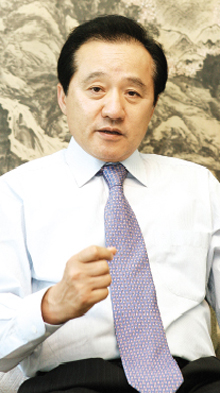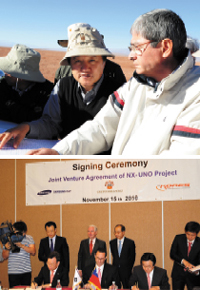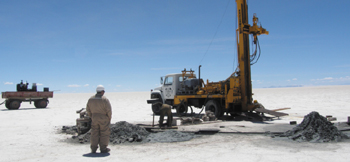KORES Eyes a Global Resources Exploration Player
Its series ¡®2+2 Strategy¡¯ yields tangible results
 Established in 1967, Korea Resources Corp. (KORES) had been charged with providing financial and technological support in the operation of privately-owned mines and mine prospecting. However, as securing natural resources overseas is getting more ever significant,
Established in 1967, Korea Resources Corp. (KORES) had been charged with providing financial and technological support in the operation of privately-owned mines and mine prospecting. However, as securing natural resources overseas is getting more ever significant,
KORES, marking the 43rd anniversary of its establishment this year, has transformed itself into a specialized resources explorer. It was on Dec. 26, 2008 that KORES was given a new mission of exploring natural resources on its own as the result of a revision of the Public Enterprise Act and its articles of association. Currently, KORES is engaged in overseas resources development projects ¡ª 10 projects related to production of resources, eight under development and 11 undergoing prospecting. The company, which has already so far invested more than 1 trillion won, including 350 billion won invested during 2010.
KORES, under the stewardship of President & CEO Kim Shin-jong, has been pulling out all the stops to explore resources overseas since 2009 by adopting the ¡°2+2 Strategy¡± focusing on two natural resources, copper and uranium, and two continents, Latin America and Africa.
The strategy is designed to maximize outcomes in order to adopt dramatic choice and concentration despite the stark reality ¡ª limited financial resources and manpower. CEO Kim has been repeatedly stressing his staff to be armed with a challenging spirit like venture company CEOs according to the strategy, proposed by himself.
The move has paid off: gaining foothold in one uranium and two copper mine exploration overseas. KORES has successfully singed deals to explore a uranium mine in Teguidda, Niger in 2009 and the Cobre Panama Mine in 2009 and a copper mine in Australia in 2008. KORES¡¯s joint venture in the Cobra Panama Mine with LS-Nikko Copper Inc. is a megaproject with 1.007 billion tons of reserves. The project calls for producing roughly 230,000 tons of copper yearly for 30 years from 2014, Korea¡¯s biggest copper mine investment overseas.
The 2+2 Strategy has gained ground for this year. KORES and LG Corp. each have acquired a 10 percent state in the Rosemont Ranch Mining Property in the United States, ranked 39th in the world, in September.
KORES has also made a feat by building foundation for making inroads into exploration in Africa. The corporation opened two African investment support centers in Kinshasa and Lumbumbasi, in the Democratic Republic of the Congo, to set up a foothold for its entry into such major African countries as South Africa, Namibia, Niger, Mozambique, the Democratic Republic of the Congo, and Zambia.
Thanks to KORES¡¯s leading investments, Korea has seen its own development rate of the nation¡¯s top six strategic minerals - bituminous coal, uranium, iron, copper, zinc, nickel ¡ª from 14.1 percent in 2005 to 25.1 percent in 2009. The 2010 target figure is tentatively set at 27 percent.
¡®2+2+¥á STRATEGY¡¯ ¡ª KORES has changed the 2+2 Strategy into the ¡°2+2+¥á Strategy¡± to add future growth minerals, including lithium, and blue ocean markets. KORES is striving to find niche markets in such Asian countries as Kazakhstan, Mongolia, Indonesia, whose access is considered to be more favorable as well as Oceania, considered to be one of untapped blue ocean markets to overcome competition from China.
KORES is aggressive in securing lithium, one of future growth minerals as it has pushed ahead with the top three strategies to occupy a lithium triangle region in Southern America for securing the mineral. In a short-term strategy, KORES has made joint investments with Samsung T&C Corp. with a 30 percent stake in the Atacama lithium project in Santiago, Chile. KORES is focusing on a long-term lithium development strategy to explore the Uyuni salt flat in Bolivia. To this end, In May, KORES hosted a briefing session on manufacturing technology of carbon lithium using salt water from the flat, and Korea-Bolivia partnerships for exploring lithium and other resources were built during Bolivian President Evo Morales¡¯ state visit to Korea in August.
On top of securing new projects, KORES has focused on improving the stable operation and efficiency of the existing businesses. KORES has made seamless preparations for the production of the nickel mine in Ambatobi, Madagascar, one of the world¡¯s top four nickel mines, next first quarter with a target operation rate of 90 percent. The two Australian bituminous coal mine projects, including the one in Mulaven, New South Wales, are to begin their projection this year, while Ambatobi project with annual production of 60,000 tons nickel will allow the Korean consortium to secure 30,000 tons of nickels per year, accounting for 25 percent of Korea¡¯s demand.
LONG-TERM PERSPECTIVE ¡ª KORES has been devoting itself into securing such green resources as uranium and lithium as well as copper and other industrial necessity minerals. In an effort to secure lithium, emerging as a next-generation energy source, the nation has attentively focused on Boliva by sending Rep. Lee Sang-deuk as a special presidential envoy. KORES President Kim made a trip to Boliva, a 30-hour distance from Korea, on six occasions, and finally agreed to import nickel from the Uyuni salt flat after meeting with Bolivian President Morarres in January. The Bolivian president signed an MOU on the lithium project during his summit talks on Aug. 26.The project is mostly likely to provide an advantage with Korea, the late-comer for developing the lithium in Bolivia.
KORES has also been stepping on the gas to secure top six rare resources ¡ª crom, manganese, lithium, rare earth, tungsten and molybdenum ¡ª by scouring prospective mining zones in such countries as China, the United States, Australia and Indian and Africa. This move is expected to yield tangible results for next year, KORES officials said. nw
Korea Resources Corp. (KORES) gains ground in its own development of resources overseas,; a scene at the Uyuni salt flat in Bolivia (Below) KORES President Kim Shin-jong.
KORES President Kim inspects the NX-Uno mining field.; KORES signs a joint venture agreement on the NX-Uno project on Nov. 15.
3Fl, 292-47, Shindang 6-dong, Chung-gu, Seoul, Korea 100-456
Tel : 82-2-2235-6114 / Fax : 82-2-2235-0799